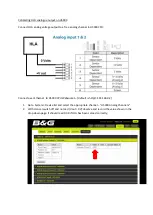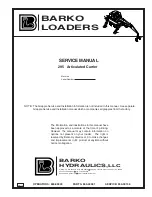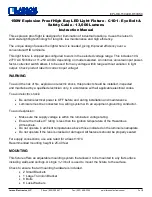
27
7.4 Using the VIRTUALIZER as an effects device for instruments
With its extensive MIDI implementation the VIRTUALIZER can also be used, for instance, as a multi-effects
device in a guitar rack. Of course, you can wire it both in stereo and mono.
Fig. 7.3: Connecting the VIRTUALIZER to a guitar amp (send/return-mono)
The following hints illustrate the VIRTUALIZERs versatility if used with a guitar amp. Basically, the VIRTUALIZER
should be inserted between the preamp and the power stage. Almost all guitar amps have an insert or effect
loop to send the preamp signal of the guitar amp to the audio inputs of the VIRTUALIZER. The VIRTUALIZER
processes the preamp signal and sends it back via the guitar amps return bus (power amp in), from where it is
routed to the power stage. When you use a stereo rack system for amplification, you can wire the VIRTUALIZER
in stereo. Connect the preamp to the audio inputs of the VIRTUALIZER, and the audio outputs (left/right) to one
channel each of the power amp (left/right).
+
Since most guitar amps only have a serial insert loop, you should make sure that the
VIRTUALIZER is set to Mix-Intern mode (see 4.1.1). In this mode you can control the effect
intensity applied to the guitar signal. However, if your amp features a parallel effect loop
which allows for adding the effect-signal portion (similar to an aux path in a mixing console),
we recommend that you use the VIRTUALIZERs Mix-Extern mode. In this case, the effect
intensity present at the output of the VIRTUALIZER is 100%, and you can use the effect loop to
determine the amount of effect added to the guitar signal.
Instrumentalists can benefit from a variety of advantages offered by the VIRTUALIZERs MIDI implementation.
For example, you can use a MIDI footswitch board to send program change commands via MIDI. Connect the
MIDI OUT jack of your MIDI board to the MIDI IN jack on the VIRTUALIZER. If the VIRTUALIZER fails to respond
to the program change commands sent from the MIDI board, check the MIDI channel settings. Consult the
users manual of your MIDI board to find out on which channels program change commands are transmitted
(usually in Omni mode). Set the MIDI channels appropriately in MIDI mode (see 6.5) and enable the VIRTUALIZER
to receive program change commands.
If your MIDI board features a controller or allows you to connect controller pedals, you can even change
parameter settings via MIDI while playing. For instance, you can freely change the effect intensity from
0-100% while playing (Contr. 27, Value 0-100). Set the controller for Mix-Intern mode (Contr. 30, Value 0) so
that it can be used to increase the effect intensity. In this way, guitar solos can be enhanced with chorus and
delay effects, while the effect intensity is gradually reduced when playing rhythm. You can even control the
function of the In/Out switch to bypass the VIRTUALIZER when an unprocessed signal is needed. Basically, all
MIDI devices that are capable of transmitting MIDI controller commands, e.g. keyboards/sequencers (see 7.5),
will allow for using these features.
The VIRTUALIZER may also be inserted between the outputs of a keyboard and the inputs of a mixing console.
If required, adapt the levels with the Operating Level switch (see 3.4).
7. APPLICATIONS
All manuals and user guides at all-guides.com







































